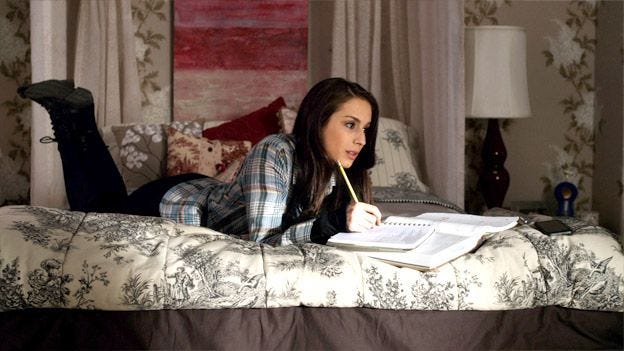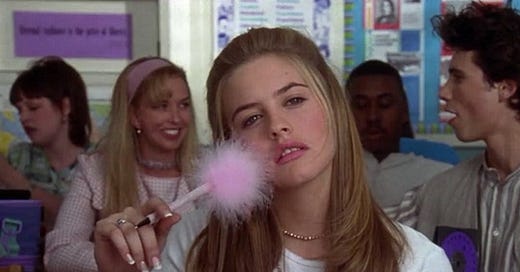
I’ve struggled with an acute degree of perfectionism my entire life. My mom told me that when I was in elementary school I struggled with getting my hands dirty while playing outside and would take my time eating, ensuring no crumbs spilled on my clothes. In middle and high school, this sharp sense of control spread to my face, as I woke up at 5:30 AM every morning before school to pack concealer onto the purple half-moons under my eyes and blemishes on my chin until the product balled up on my skin. Orange splotches and rigid brows, but at least the blemishes were “concealed.” For no reason other than I felt like I had to. Felt like I was somehow less of myself or at least less of the version of myself I wished people to see me as if I didn’t go to all the trouble.
But my perfectionism reached a fever pitch in the academic space. If my grade dropped below an A (even dipping into A- territory) I felt completely and utterly worthless and stupid. Like I would never be able to go to college or get a well-paying job or live a fulfilling life because of some percentage. And whenever I tried to talk about this anxiety with other people - friends and family - it was quickly shrugged and laughed off because, obviously, an A is an objectively high-ranking grade, if not the highest-ranking grade. It became clear that I was annoying people with my neuroticism, as they were facing their own unique struggles (like trying to actually pass classes) and mine seemed fraught in comparison. So I tried my best to keep my stress in. And, yet, it still felt like a tornado was ripping my insides apart every time I was given a paper that had 90% stamped on it.
As I’ve written about in other articles, my academic perfectionism reached its highest heights to date during the COVID-19 pandemic when I was taking college courses out of my childhood bedroom. With little else to do, I sought control amid a spiraling world through my studies. I made sure that every word on every page was read and memorized, and that every paper turned in had been proofread countless times over. As I fine-tuned my admissions essay for my major, there were many nights when I got out of bed to read over my paper, again and again, seeing if there was anything I was missing, tears brimming my eyes.
I’ve always been hesitant about writing about this experience because I’ve always considered it rather individual to me. Especially during the pandemic, I can recall many people in my life understandably expressing their struggle with getting motivated to take care of themselves and complete tasks. I, on the other hand, found it impossible to slow down and feel any sense of peace with myself or what I had accomplished.

After attending therapy for several years, implementing some healthful practices like daily meditation, movement, and journaling, and reading some helpful literature (like the book Self-Compassion by Kristen Neff), I feel like I am much more at ease than I was years ago. Though I definitely still have my moments.
I, in many ways, consider myself to be a “recovering perfectionist.” A significant aspect of being a recovering perfectionist is learning how to take on new projects with a more balanced approach. Whenever I get a new opportunity or have a new idea, I find myself hesitant to launch into it, fearful that my controlling tendencies will creep back up and kill the joy of it. This was certainly the case for starting this newsletter. I had a couple of ideas for potential blog posts but knew that once I got the ball rolling I could fall into an unhealthy routine. Keeping myself beholden to a rigid deadline, even if it meant putting out half-baked pieces of writing that weren’t contributing anything valuable to my intimate online bubble. Sacrificing content for control, quality for routine.
While I try to write at least a little bit daily, there are some days when I’m utterly stumped. An idea often goes from my brain to the page as smooth as butter, but many other days, it feels like my brain’s gears are screeching, grinding, and skipping as they attempt to formulate anything of substance. Many would call this a “creative block”
And it’s quite frustrating when this occurs. When I struggle to write, I start re-considering whether I’m actually a writer because I’m not pumping out brilliant essays every day. Even though I always manage to find something that ignites a fire in my pen with enough time, thought, and inspiration.
I think this frustration with “creative blocks” is largely a byproduct of living in a culture that increasingly values output over ingenuity. I mean, obviously, some of the world’s most life-changing inventions and art have come from American creators - we certainly have a history of creativity. And yet, as the country continues its capitalist “progression,” the wealth chasm grows bigger by the day due to the creation of millions of “things” for us to consume, many of which are not reinventing the wheel.
In addition, in the United States in particular, there is tight entanglement of what one does or produces and one’s identity. It’s one of the first questions adults ask each other upon meeting: what do you do? Referring to one’s job, their primary stream of income, even though that can be a small - if not, minuscule - aspect of who somebody is.
And, in American culture, we’re considered valuable when we are working and producing, even if it’s not toward some kind of tangible, practical, or even identifiable goal. I think the That Girl trend on TikTok illustrates this well. A legion of young women in athleisure sets telling you that you need to monitor what you eat, work out every day, journal, and do your skincare routine so that you can achieve the always vaguely outlined objective of “wellness.” Of course, all of these items can help you achieve a more balanced life, most effectively when they’re done with intention and not under the premise of falsely made promises or because someone on your “for you page” who looks like they have their life together is doing them. I think these types of trends have the habit of turning women into busy worker bees, constantly trying to self-optimize towards a level of perfection that is non-existent.
The reality of engaging in creative work is that there are often long periods of inactivity. Long periods of looking at the world and absorbing it so that you can compose some kind of response via your art. If you’re constantly trying to manufacture some kind of quasi-artistic product to share for the sake of creating output, you’re going to end up with something that feels inherently less inspired because it is. The fast fashion of art.
Instead of beating myself up for not creating, I now try to use that energy to push myself to get inspired. Read other people's articles. Watch a movie. Walk around outside listening to music. Have conversations with friends. These moments are when my best ideas are born.
To fellow creatives, let me tell you that your moments of inaction don’t make you less creative. Those are some of your most important moments. To be a sponge. Without stimulus, there are no revelations. Nothing good can come from forcing yourself to expel ideas that don’t exist. Don’t be afraid to spend less time reading over college essays for the umpteenth time, packing concealer onto already-concealed blemishes, and otherwise grinding your gears to their bone. Instead, spend more time being in the world, fearless of the crumbs falling on your clothes.






I love this so much!